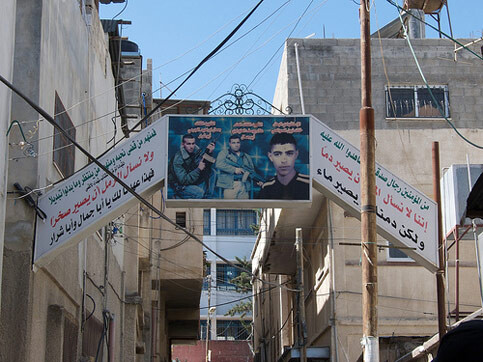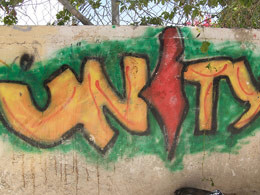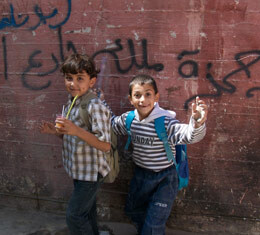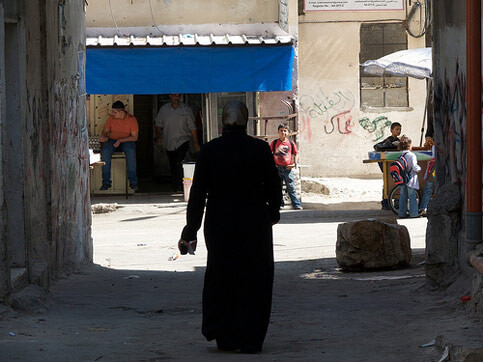Balata refugee camp, West Bank 31 October 2008

“Martyrs Road” in the Balata refugee camp commemorates Palestinian resistance fighters killed while fighting the Israeli occupation.
The group of internationals I had traveled with to the northern West Bank city of Nablus had decided to park our car just behind the Huwwara checkpoint, where Israeli soldiers control Palestinian movement to and from the city. From the outset, I began taking pictures of an Israeli military outpost littered with heavy tanks and armored vehicles — all pointing in the direction of the beleaguered city — as I had documented the Israeli occupation throughout my travels through the West Bank. However, as I slung my camera over my shoulder and proceeded with my fellow travelers to the checkpoint, an Israeli army jeep suddenly appeared beside me. Through the plastic zipper window of the military transport I saw two fingers aggressively pointing in my direction. Struggling to explain myself, my camera was quickly confiscated and I was pulled inside the vehicle where I was subjected to a barrage of threats.
It was harassment for the sake of harassment. And this would be the first time I was to experience — to a very small degree — what Palestinians endure as a matter of course. After deleting all the offending photographs and being lobbed a few extra threats for the road, I exited the vehicle with my camera still intact and after a few labored breaths, we continued on to Nablus.

Graffiti on a wall in the Balata refugee camp.
In Balata, where overcrowding is an understatement, the average living space is just a few meters per person — compared to over 1,300 meters per person in Israel. Considered alongside the psychological reality of zero privacy, little sunlight, near nightly Israeli military incursions and a hazardous lack of ventilation, it is easy to see how these conditions are not only intolerable — they are disastrous.
Still shaken by my incident at the checkpoint only an hour before, I had trouble adjusting to the situation within the camp as we began the claustrophobic tour of the kilometer-wide living space. As we were shown around the streets of Balata, we walked sideways in order to move between buildings, as most streets are only a few feet wide. The cramped conditions are further exacerbated by almost no ventilation through the streets or within buildings. Respiratory ailments are widespread in Balata, and children are especially vulnerable to asthma.

Children in the Balata refugee camp.
Most of the children I met in the camp had never left Balata and many are unfamiliar with the world that exists beyond the Israeli checkpoints that surround Nablus. When a Spanish non-governmental organization invited 20 children from the camp to visit Spain in 2006, a child asked the delegation if Spain was inside or outside of the Nablus checkpoint. When told they were indeed traveling beyond the checkpoint, the group of children burst with excitement, while their parents simply wept realizing the significance of such an opportunity.
With only three schools in Balata — which must collectively cope with over 6,000 students — the level of illiteracy has increased from 22 percent in 1988 to 27 percent 1997. Unemployment is almost total (currently estimated at over 75 percent), as workers had previously found seasonal work within Israel. Most of the workers lost their jobs because of Israeli-imposed curfew, closure and permit restrictions.

A woman walks down one of the narrow streets to the main street of the Balata refugee camp.
Health conditions have also worsened in the camp with only one United Nations-operated health clinic in the entire area. There are over 500 refugees for each doctor and the international funding the UN receives has been insufficient to deal with the worsening conditions. Lack of adequate housing is another major problem; the buildings are built upon weak foundations and are unable to cope with the population’s growth.
We slowly made our way back to the Huwwara checkpoint, the impending sunset threatening to block our exit on the eve of Yom Kippur, as Israel imposes severe movement restrictions during Jewish holidays. At the checkpoint, I was immediately thrust into the chaos that comes with the occupation, getting a taste for the second time that day of what Palestinians endure on a regular basis. Huwwara was tense and disorderly and I found myself at the back of a massive line of hundreds of Palestinians trying desperately to cross before sunset, Israeli soldiers staring down the sights of their M-16 machine guns. I felt exposed, powerless and vulnerable — what Palestinians must feel every day.
Watching the sun slowly set, I began to face the very real prospect of missing my flight back to the UK and potentially remaining in Nablus for several days until the end of the Jewish holiday. Desperately, we began waving our passports, hoping the soldiers would allow us to exit before the area was sealed. Eventually our Western privilege allowed us passage to our cars on the other side of the checkpoint and flying at top speed back to Jerusalem, we narrowly made our crossing out of the West Bank — a passage unthinkable for most Palestinians.
Looking back on that day, and remembering the faces I had met — both inside the Balata camp and around the Huwwara checkpoint — I am still amazed at the dignity and resolve that remains with a people who are forced to live under the strangling conditions of military control. This was not an exceptional day in the West Bank. This is every day.
All images by Eddie Vassallo.
Eddie Vassallo lives and works in London and is the Founder of bruisedearth.org, a new website dedicated to sharing news, information, and original commentary on the occupation of Palestine.



